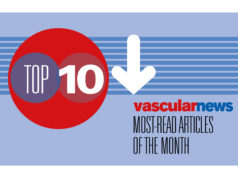
Vascular surgeons have an integral role to play in major haemorrhage protocol (MHP) trauma calls, polling taken during the Vascular Trauma Controversies session at Charing Cross (CX) 2021 Digital Edition (19–22 April, online) reveals. Attendees of the final session of the four-day digital symposium delivered a resounding 77% result in favour of the motion ‘Vascular surgeons are integral to all MHP trauma calls’—suggesting a strong preference for involving vascular specialists in such cases.
The Vascular Trauma Controversies session put a spotlight on MHPs, with Karim Brohi (London, UK) detailing a number of the important considerations and controversies for hospitals in developing and implementing their own protocol. “It can either be a dry document that is never really applied, or something that is living and dynamic, and really effects the functioning of the whole hospital in terms of how it responds to critical bleeding,” Brohi said, commenting that having an ‘active’ haemorrhage protocol is important, with potential benefits beyond just trauma patients.
MHPs are a process that prioritises the control of haemorrhage, Brohi commented, offering a roadmap for the mobilisation of expertise and resources in response to critical bleeding. Their introduction has contributed to “big strides” in the improvement of outcomes in critical bleeding cases, Brohi said.
Brohi by was asked by session moderator Christopher Aylwin (London, UK) how institutions adequately can train operators to implement a successful protocol, to which he responded that ongoing review of governance and cases is a chief factor. “We have had a protocol for a decade and we still have issues we have to deal with on a daily basis,” he commented.
Focus later turned to the role that the vascular surgeon plays in response to critical bleeding in trauma cases, with trauma surgeon Jamie Coleman (Denver, USA) putting forward the case that vascular surgeons offer “priceless” skills that are integral to all MHP trauma calls.
Coleman debated the issue with vascular surgeon Tal Hoerer (Oerebro, Sweden), making the point that timely haemorrhage control “cannot be overstated”, and is key to survival. “Time means blood, means outcomes,” Coleman said. “Having the ability to employ endovascular and advanced vascular surgery techniques in the operating room, and in conjunction with other ongoing surgeries saves time. Time in massive haemorrhage often makes the difference between life and death.”
Responding, Hoerer made the point that the majority of trauma cases do not involve bleeding, and many are non-vascular. Vascular surgeons can employ different techniques to stop bleeding, he noted, as well as supporting decision-making. However, he made the point that the need for vascular specialists to be routinely involved in trauma cases is largely a regional concern, pointing out in his slides that differences in the number of trauma cases linked to violent crimes are likely to be a factor as well as available local expertise.
Moderator Ross Davenport (London, UK) said that the discussion reflected the “transition we find ourselves in, both in vascular surgery and in trauma care”. He asked Coleman how often the trauma surgeon is likely to be the “driving force” for trauma cases. Coleman responded that the majority of cases are led by the trauma surgeon, but said that it is important to recognise the limitations of each specialty. “If you have got something big and bleeding, and it is audibly bleeding at you, you have got to be able to get control of that quickly, and if you are not able to do that by yourself, you have got to phone a friend,” she said.
Polling after the debate delivered a resounding result in favour of vascular surgeons having an integral role to all MHP trauma calls—more than three quarters of votes cast in favour of the motion.
Attendees to the Vascular Controversies session also received an update on the UK-REBOA (Resuscitative Endovascular Balloon Occlusion of the Aorta) trial. Presenter Jan Jansen (Birmingham, USA) said results of the first randomised trial to use the technique may be edging closer, with the trial on track to recruit 120 patients for study.












